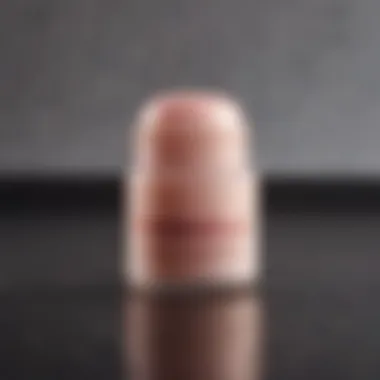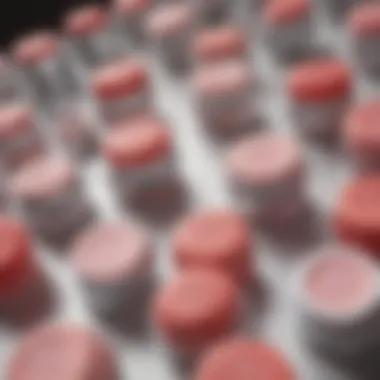Top Lip Balms for Lip Biters: Essential Guide


Intro
Lip biting is more than just a habit for many—it can become a constant cycle of discomfort and irritation. People who frequently bite their lips often find themselves battling chapped, dry, and cracked lips, resulting in a need for special care. The right lip balm can be a game changer, offering not only hydration but also protection against future damage. In this comprehensive guide, we will explore the best lip balms specifically designed for habitual lip biters, looking closely at their ingredients, textures, and effectiveness. We'll analyze user reviews and dermatological insights to help you choose a product that suits your unique needs.
Beyond just product recommendations, we'll delve into the psychological aspects surrounding lip biting, helping understand why some people resort to this behavior and how they can combat it. This guide seeks to empower you to make informed decisions for healthier, happier lips.
The Unique Needs of Lip Biters
Lip biting creates an immediate need for both healing and prevention. This habit often leads to damaged skin and persistent dryness, making it essential to choose a lip balm crafted with specific ingredients that address these concerns. A balm that provides adequate moisture while facilitating healing is paramount.
Why are moisture-retaining ingredients so important? Well, ingredients like shea butter and jojoba oil are not merely buzzwords; they form a barrier against environmental factors while actively nourishing the skin. Moreover, products containing natural waxes can help seal in moisture and add a protective layer over sensitive areas.
Key Ingredients to Look For
When selecting lip balm, consider the following essentials:
- Shea Butter: Offers deep hydration and helps heal cracked lips.
- Vitamin E: An antioxidant known for its soothing properties.
- Beeswax: Acts as a natural barrier, sealing in moisture.
- Aloe Vera: Known for its healing properties, particularly effective for minor irritations.
- Coconut Oil: Moisturizes while providing anti-inflammatory benefits.
Utilizing products with these ingredients can make a noticeable difference in your lip health.
An effective lip balm not only hydrates but also aids in the healing process of damaged skin.
Psychological Aspects of Lip Biting
Understanding the roots of lip biting can be just as important as treating the physical damage. For some, it's a response to stress or anxiety, manifesting itself in repeated motions that provide temporary relief. Recognizing the triggers can be the first step toward breaking the habit.
Techniques like mindfulness or stress-relief practices might be helpful to mitigate the urge to bite. Being proactive by using lip balm frequently can also play a role in reducing the temptation—when lips feel good, there’s less reason to pick at them.
Alternative Preventive Measures
In addition to choosing the right lip balm, consider incorporating these habits into your routine:
- Stay Hydrated: Drink plenty of water to nourish your skin from within.
- Use a Humidifier: Keep indoor air moist, especially in winter months.
- Mindfulness Techniques: Explore activities like meditation to ease anxiety.
By implementing these strategies, you increase your chance of healing and prevention, paving the way for smoother, healthier lips without the cycle of biting and healing.
Understanding Lip Biting
Understanding the nuanced behavior of lip biting plays a crucial role in this guide, especially when addressing the needs of those grappling with this habit. Lip biting goes beyond mere physical action; it is often intertwined with emotional states, stress responses, and psychological triggers. Recognizing these elements helps us tailor our approach to lip care and select lip balms that not only protect but also heal. So, whether you're a long-term offender or someone who's just started, grasping the essence of why you bite your lips is the first step toward better lip health.
The Psychology Behind Lip Biting
Lip biting can be an unconscious reaction to anxiety or stress. The act of chewing on one's own lips often serves as a coping mechanism—think about it, when you're lost in thought or feeling pressure, your lips might bear the brunt of it. This seemingly innocuous behavior can provide a momentary distraction, but over time, it can lead to substantial damage. In some cases, it ties back to deeper psychological issues. For instance, experts highlight that it may stem from feelings of insecurity or a sensation of needing control in chaotic environments. A better understanding of these psychological roots can aid individuals in addressing the habit, paving the way for healthier lips and peace of mind.
Common Reasons for Lip Biting
There are various facets that lead to the habit of lip biting, making it a common phenomenon among different age groups. Some of these reasons include:


- Stress and Anxiety: Many people resort to lip biting as a response to stress. When anxious, the mouth can be a natural focus, which often results in biting.
- Boredom or Habit: Sometimes, the action becomes habitual. People may bite their lips mindlessly while performing tasks like reading or watching TV.
- Dryness and Irritation: If lips are dry, you might be more tempted to bite them as a reflexive response to discomfort. This can create a vicious cycle of damage and healing.
- Concentration: Some individuals may notice they bite their lips more when they're concentrating or deep in thought, using the behavior as a slight distraction.
Understanding these underlying motivations is essential. By recognizing the triggers behind lip biting, individuals are better equipped to take proactive measures in managing the habit. This awareness is particularly beneficial when selecting lip balms that can actively contribute to healing damaged lips and providing long-lasting moisturization.
Lip Care Basics
Lip care is often overlooked, yet its significance is paramount, particularly for individuals who struggle with lip biting. The delicate skin on our lips is susceptible to damage, chapping, and infections. Therefore, understanding the essentials of lip care can help maintain health and comfort. In this section, we will dissect the importance of lip balm, explore critical ingredients to consider when selecting a product, and examine different textures and formulations to best suit individual needs.
Why Lip Balm is Essential
Lip balm serves as a protective barrier against environmental elements and aids in moisture retention. For those prone to lip biting, it becomes even more crucial. A good lip balm can alleviate discomfort from broken skin and serve as a deterrent against the habit itself. With different formulations available, finding the right balm helps keep lips hydrated and less prone to damage, making it an indispensable part of daily skincare routines.
Key Ingredients to Look For
Natural oils and butters
Natural oils and butters, like coconut oil and shea butter, play a vital role in lip care. These ingredients are well-known for their moisturizing properties. They penetrate deep into the skin, providing lasting hydration. Coconut oil, for example, is not only moisturizing but also has antifungal properties, which can be beneficial for the healing process. The unique feature of these natural ingredients is their nourishing effect; however, they can be heavier and might take longer to absorb compared to synthetic options.
Vitamins and antioxidants
Vitamins and antioxidants, such as Vitamin E and C, offer significant benefits in lip care. They assist in combating oxidative stress and promote skin repair. The presence of Vitamin E, in particular, helps in soothing irritated lips, making it a popular choice among lip balm formulations. Their unique selling point lies in their ability to improve skin resilience over time. Nonetheless, users should ensure these vitamins are formulated correctly to avoid reactions or sensitivities.
Humectants and occlusives
Humectants like glycerin and occlusives such as beeswax are essential components in lip care. Humectants work by drawing moisture into the skin, while occlusives provide a protective seal. This combination ensures that the lips stay moisturized while preventing moisture loss throughout the day. Their key characteristic is their dual-action approach to hydration. However, users might find that occlusives can feel sticky, which isn’t always ideal for every lip-biter.
Textures and Formulations
Balms vs. glosses
When it comes to lip care, one often faces the choice between balms and glosses. Balms typically provide a thicker, more hydrating layer, ideal for repair and protection against chapping. Glosses, on the other hand, offer a shiny finish and are generally lighter but can lack the deep hydration necessary for dry lips. The decision between the two largely depends on personal preference and the specific lip care needs of the user, with balms being more suited for overcoming the consequences of lip biting.
Stick vs. pot formulations
Stick formulations are favored for their convenience, making application quick and easy while minimizing contamination. They typically offer a more defined application area. Pot formulations, while sometimes seen as cumbersome, often provide richer formulations with the ability to scoop out the amount needed. However, one should follow safe hygiene practices with pot products to prevent the introduction of bacteria. Ultimately, the choice between stick and pot boils down to lifestyle and personal preference, each having its unique advantages and potential drawbacks.
Top Lip Balms for Lip Biters
When it comes to keeping those lips in shape, especially for habitual lip biters, knowing the right lip balm makes all the difference. Constant lip biting can lead to chapped, painful lips, so a balm that fits the bill for healing is crucial. Not only do the right balms moisturize, but they also act as a barrier against further damage. This section dives into what makes a lip balm worth its salt for those who find it difficult to resist the urge of nibbling on their own lips.
Criteria for Selection
Selecting the best lip balms involves more than just a pretty package or a pleasant scent. Here are some key elements you should consider when looking for the perfect balm:
- Ingredients: Natural oils, vitamins, and other nourishing components should top the list.
- Texture: A balm that feels good on the lips is more likely to be used consistently.
- User Feedback: Reviews from actual users can tell you what to expect—both good and bad.
- Effectiveness: The product needs to deliver on promises like healing chapped lips and providing lasting moisture.
- Price Point: Good value is essential, especially if you tend to go through balms quickly due to frequent application.
Recommended Products


Product A: Benefits and Ingredients
One lip balm that frequently gets thumbs up is Aquaphor Lip Repair. The standout feature here is the combination of sheer moisture and protection. This balm contains a blend of natural moisture-retaining ingredients that's ideal for lip biters. The addition of ingredients like shea butter and vitamin E also promotes quick healing. Its smooth texture means it glides on effortlessly, which could make you less likely to bite, as lips feel healthy and well cared for. Though some might find the price slightly higher than average, the quick results can compensate for the initial investment.
Product B: User Reviews and Ratings
Next up is Burt's Bees Beeswax Lip Balm. The rave reviews often highlight its natural origins. This product is made with beeswax, which locks in moisture and serves a protective role, while added peppermint oil lends a gentle cooling sensation. Users repeatedly rave about its effectiveness in soothing dry lips, making it a go-to option among those who aim for healing and hydration. One potential downside? Some find the scent a bit overpowering, but for many, it’s a small price to pay for such effective lip care.
Product C: Value for Money
Lastly, we have Eucerin Advanced Repair Lip Balm. This product stands out when it comes to value for money. It’s packed with ceramides, which are crucial for restoring the skin barrier, especially for those who face frequent biting. Many users find that, contrary to cheaper alternatives, Eucerin provides lasting moisture with just one application which can be a real time-saver. However, it might feel heavier on the lips than other options. Still, if you're someone who is dedicated to keeping their lips nourished without breaking the bank, this is a worthwhile choice.
Choosing the right lip balm is crucial for maintaining lip health and minimizing the temptation to bite. Prioritize ingredients that not only moisturize but also heal.
By considering these products and their unique features, you can select a lip balm that caters specifically to the needs of those who struggle to keep their lips intact. Each recommendation provides a clip of hope for healthier, happier lips.
Healing and Prevention Techniques
Dealing with lip biting is more than just a cosmetic concern; it’s about ensuring your lips remain healthy and unscathed. The techniques employed for healing and preventing further damage are essential for any lip biter. These methods not only help soothe existing irritation but also empower individuals with strategies to break the habit.
Immediate Care for Chapped Lips
When you find yourself in the throes of a lip-biting episode, the first step is immediate care. This involves quickly addressing any damage you might have caused to your lips, preventing situations from worsening.
Home remedies
Home remedies for chapped lips often feature ingredients that are easily found in household kitchens. Simple staples like honey, coconut oil, or even sugar can do wonders for your lips. One popular method involves mixing olive oil with sugar to create a gentle scrub; this helps to exfoliate dead skin while providing moisture.
The key characteristic of home remedies lies in their natural composition. People are gravitating toward these solutions as they’re free from chemicals and synthetic additives. They tend to be a beneficial choice for those wary of commercial products, particularly for individuals with sensitive skin or allergies.
However, while they offer numerous advantages, they can also be hit-or-miss. For example, an individual may find a specific remedy effective, while someone else may not see any benefit. This variability makes it crucial to experiment and see what works for your unique needs.
Effective lip masks
On the other hand, effective lip masks are a luxury many lip biters are starting to embrace. These products, often infused with intense moisturizers and vitamins, deliver hydration directly to the lips. Their specialty lies in how they adhere to the lip surface, locking in moisture and protecting against environmental aggressors.
The distinctive characteristic of lip masks is their ability to offer deep nourishment. Unlike regular lip balms that mostly provide surface hydration, these masks can penetrate further, often yielding quicker results. This characteristic makes lip masks a popular choice for those looking for immediate relief or intensive treatment for severely chapped lips.
One downside is that lip masks usually come at a premium price and may require additional time to incorporate into your daily routine. Despite this, their effectiveness keeps them in the running for essential products for lip care, especially for those who are serious about their lip health.
Long-term Strategies to Curb Lip Biting
While immediate care is crucial, thinking ahead with long-term strategies can make a world of difference. Curbing the habit of biting your lips necessitates an understanding of underlying triggers and the cultivation of healthier alternatives.
Behavioral modifications
Behavioral modifications involve conscious efforts to replace biting with other, less harmful habits. This can include keeping your hands busy with a fidget toy or adopting a complex hobby that requires fine motor skills. Setting small, attainable goals—like reducing lip biting to a certain number of times a day—can build confidence and promote change.


The pivotal characteristic here is the awareness of triggers. Building an awareness of what provokes lip biting—stress, boredom, or anxiety—can assist in developing healthier coping mechanisms. This makes it a beneficial approach because it not only tackles the physical aspect but also addresses the root causes, leading to sustained change over time.
Nonetheless, behavioral modifications require consistent effort and can sometimes be frustratingly slow to show results. This can deter some individuals, highlighting the need for patience and persistence.
Mindfulness practices
Mindfulness practices, such as meditation or focused breathing exercises, offer a holistic approach to managing stress or anxiety—common triggers for lip biting. These practices foster present-moment awareness, allowing individuals to recognize when they’re about to bite their lips and gently redirect their attention elsewhere.
The fundamental aspect of mindfulness is its ability to cultivate self-compassion and understanding, giving one tools to address harmful habits without harsh criticism. This works as a beneficial technique, as it not only reduces lip biting in the moment but also strengthens emotional resilience over time.
However, incorporating mindfulness into one’s daily routine can be overwhelming for some. Finding consistent practice requires commitment, and the benefit won’t always be seen overnight. Having said that, the investment in time and effort pays off by significantly improving overall well-being as well as addressing lip health issues.
Expert Opinions on Lip Care
When it comes to maintaining healthy lips, insights from professionals can really steer the ship. Expert opinions on lip care provide both scientific backing and practical tips that are invaluable for those who have a tendency to bite their lips. In this guide, the expert perspectives included not only help in understanding the importance of specific lip care products, but also outline how they can make a meaningful difference in your daily routine.
Getting advice from dermatologists, beauty specialists, and even experienced users offers a well-rounded view of lip care. Experts often highlight the necessity of hydration, protection, and proper product selection, especially for habitual lip biters. With lip biting often leading to chapped and peeling lips, it’s crucial to know the right remedies, and that’s where expert opinions shine.
Dermatologist Insights
Dermatologists stress the importance of choosing lip balms that offer both immediate relief and long-term benefits. Their recommendations usually point to products rich in natural oils and certain vitamins. A common suggestion is to look for ingredients like shea butter and coconut oil, which can soothe irritation and promote healing.
Many dermatologists suggest that users avoid products containing artificial fragrances or colors, as these can sometimes exacerbate sensitivity. According to Dr. Jane Smith, a renowned dermatologist, "Quality lip care is not just about moisturization, it's about creating a barrier against external elements. This is especially important for individuals who bite their lips, as damaged skin is more susceptible to infections."
Another key point raised by dermatologists is the importance of hydration from the inside out. Drinking adequate water, having a balanced diet, and avoiding excessive caffeine and alcohol can also play a substantial role in lip health. By prioritizing these holistic approaches, consistent improvement can be seen.
User Testimonials and Experiences
User experiences can often provide practical insights that formal research might overlook. Many users have shared their stories about the struggle with lip biting and the search for effective lip balms. One testimonial from an avid lip balm user highlights how finding a balm with beeswax helped her regain a healthier appearance: "I was convinced all the balms were the same, but once I switched to one with beeswax, my lips were softer and less prone to peeling."
Social media platforms, especially discussion threads on sites like Reddit, are filled with individuals sharing their favorite products and techniques for healthier lips. A common theme in these conversations is the effectiveness of maintaining a consistent routine. Users often mention that applying lip balm several times a day, especially before bedtime, has made a huge difference.
Additionally, some users report that they have combined behavioral strategies with their lip care. One person noted, "I started using a fidget tool when I felt the urge to bite my lips, and I continued applying balm regularly. Now, both my lips and my mental habit are in check!"
Finding the right balance in lip care is very much a shared journey. By blending professional recommendations with real-life experiences, individuals can create a personalized lip care regimen that works for them.
End
Understanding the whys and hows of lip care, especially for habitual lip biters, is pivotal in maintaining not just healthy lips but also overall confidence. As discussed, lip biting can stem from a myriad of psychological and habitual triggers. This article has navigated through essential lip care, touched on various lip balm selections, and emphasized the importance of both healing and preventing lip damage. In essence, the right lip balm not only soothes and nourishes but also acts as a barrier against habitual biting.
Summary of Key Points
- Psychological Underpinnings: Lip biting often intertwines with anxiety and stress, making awareness and understanding a crucial first step.
- Lip Care Fundamentals: An effective lip balm can contain natural oils, humectants, and ingredients that promote healing.
- Product Selection: Recommendations are based on user feedback, formulation textures, and value.
- Holistic Approach: Incorporating behavioral tactics and mindfulness aids in reducing the urge to bite while ensuring lip health.
As we draw this discussion to a close, it’s crucial to recognize that lip care is not just about aesthetics; it’s a reflection of self-love and attention to personal well-being. Striving for healthier lips is more than just a goal; it’s a commitment to oneself.
Encouragement for Better Lip Health
Taking the plunge towards better lip health can sometimes feel daunting, but small steps lead to significant changes. Remember, it’s not just about choosing the right lip balm. Developing mindful habits, like recognizing triggers for lip biting and incorporating nourishing products into your routine, can make all the difference.
- Stay Hydrated: Water not only keeps you hydrated from within but can also minimize dryness.
- Mindfulness Practices: Try deep breathing or journaling to address underlying stressors that may lead to lip biting.
- Routine Checks: Regularly assess your lip care routine. Are you applying lip balm consistently? Have you re-evaluated your choices based on the latest insights?
Ultimately, cultivating an awareness of your habits combined with the right products places you on a path towards healthier, smoother lips. Don’t underestimate the power of taking intentional steps to care for this often-overlooked aspect of your beauty regime. Embrace this journey; your lips will thank you.



